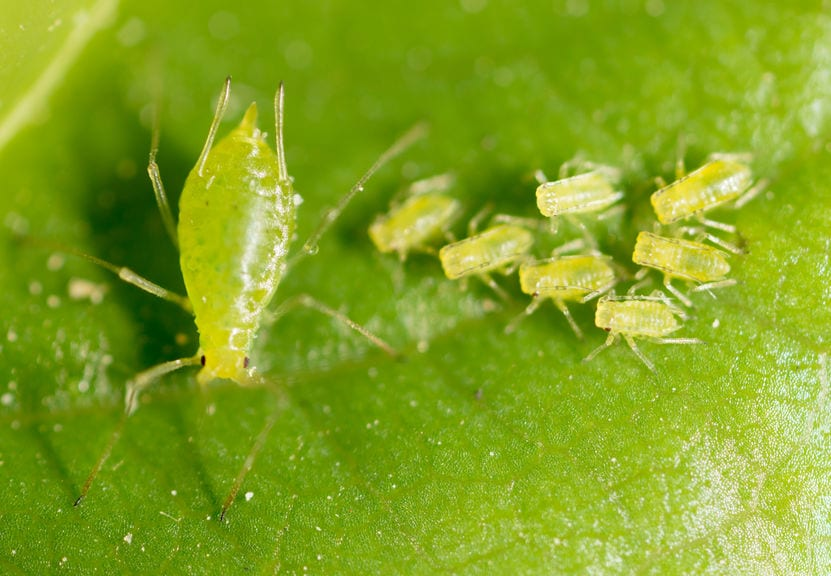Aphids, commonly known as greenfly or blackfly, can be a persistent problem in gardens and greenhouses. These small sap-sucking insects can cause significant damage to a variety of plants by stunting growth and spreading diseases. In this article, we’ll discuss effective methods to control aphid populations to keep your plants healthy and thriving.
Understanding Aphids

Before delving into control methods, it’s essential to understand your enemy. Aphids are tiny, soft-bodied insects that come in various colors, most commonly green and black. They feed on plant sap, which weakens the plant and can lead to the transmission of plant viruses. Aphids reproduce rapidly, so an infestation can quickly get out of control if not addressed promptly.
Aphids are typically found on the underside of leaves, on new growth, and at the tips of stems. They excrete honeydew, a sticky substance that can attract other pests like ants and create a favorable environment for sooty mold. Recognizing the early signs of an aphid infestation is crucial for effective control.
Cultural Control Methods
Cultural control methods involve altering the growing environment to make it less favorable for aphids. One of the simplest ways to control aphids is by regularly inspecting your plants and removing any infested parts. Here are some other cultural methods:
- Encourage Beneficial Insects: Ladybugs, lacewings, and parasitic wasps are natural predators of aphids. Planting flowers like marigolds and daisies can attract these beneficial insects to your garden.
- Companion Planting: Certain plants, such as chives, garlic, and onions, can repel aphids. Planting these near susceptible plants can help reduce aphid populations.
- Water Jet: Sometimes, a strong blast of water from a hose can dislodge aphids from plants. This method is particularly useful for sturdy plants that can withstand the force of the water.
Biological Control Methods
Biological control involves using living organisms to reduce aphid populations. Introducing or encouraging natural predators can be an effective way to keep aphids in check. Ladybugs are one of the most well-known aphid predators; releasing them in your garden can significantly reduce aphid numbers.
Another effective natural predator is the parasitic wasp, which lays its eggs inside aphids. The developing wasp larvae then consume the aphid from the inside out. While this may sound gruesome, it’s a natural and effective way to control aphids without using chemicals.
Organic and Chemical Control Methods
When cultural and biological methods are insufficient, organic and chemical controls can be considered. Organic insecticidal soaps and neem oil are popular choices for controlling aphids. These products suffocate the aphids and are generally safe for beneficial insects when used correctly.
In cases of severe infestation, you may resort to chemical insecticides. It’s crucial to choose a product labeled for aphid control and to follow the application instructions carefully to minimize risks to beneficial insects and the environment. Always use chemical controls as a last resort and aim to explore more sustainable options first.
Prevention Tips
Preventing aphid infestations is better than dealing with them after they’ve occurred. Regular monitoring and early intervention are key to keeping aphids at bay. Here are some prevention tips:
- Regularly inspect plants for signs of aphids and remove any you find.
- Maintain healthy plants by providing adequate water and nutrients, as strong plants are less susceptible to aphid damage.
- Avoid over-fertilizing, as excessive nitrogen can lead to lush, tender growth that is particularly attractive to aphids.
- Remove weeds and debris, which can serve as habitats for aphids and other pests.
Conclusion
Controlling aphids requires a multi-faceted approach that includes cultural, biological, organic, and chemical methods. By understanding the behavior and life cycle of aphids, gardeners can employ effective strategies to manage these pests and protect their plants. Regular monitoring and prevention are crucial to maintaining a healthy and vibrant garden. Always consider starting with the least invasive methods and escalate only if necessary.
FAQs
What plants are most susceptible to aphids?
Aphids can attack a wide range of plants, but they are particularly fond of roses, beans, cabbage, potatoes, and tomatoes. They are also common in flowering plants like sunflowers and daisies.
Can aphids harm humans?
Aphids do not harm humans. They are primarily a plant pest and do not bite or transmit diseases to people.
How can I attract natural predators to my garden?
Planting a diverse range of flowers can attract beneficial insects like ladybugs, lacewings, and parasitic wasps. Marigolds, daisies, and yarrow are particularly effective at attracting these natural predators.
Is it safe to use chemical insecticides on edible plants?
If you choose to use chemical insecticides on edible plants, ensure the product is labeled safe for use on food crops. Follow the application instructions and adhere to the waiting period before harvesting to ensure the produce is safe to eat.
How often should I inspect my plants for aphids?
It’s recommended to inspect your plants at least once a week, especially during the growing season. Early detection is crucial for effective control of aphid populations.
